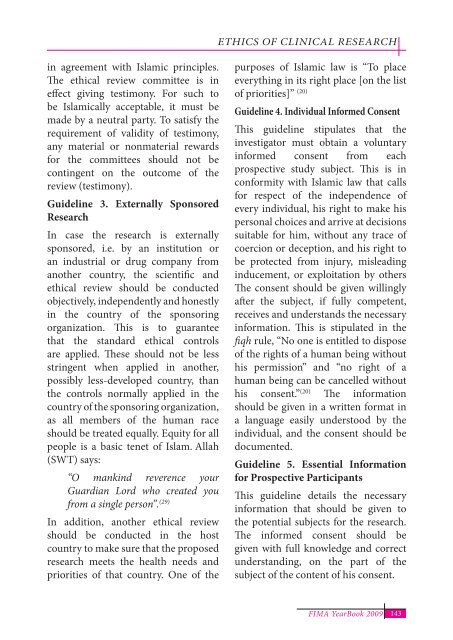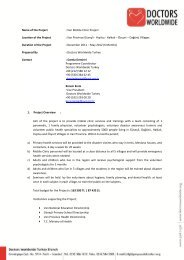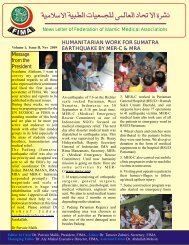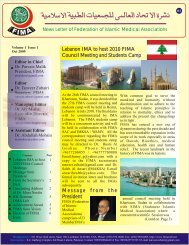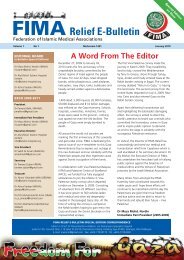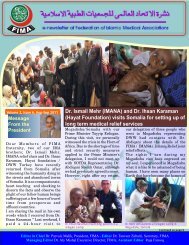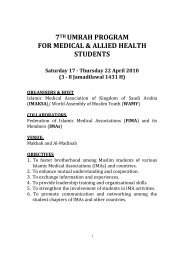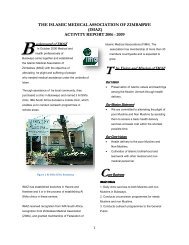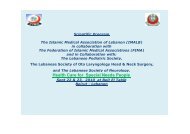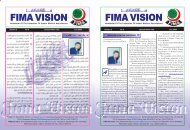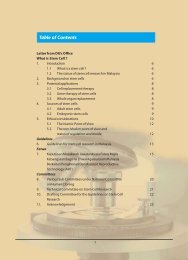FIMA Year Book 2009 - Federation of Islamic Medical Associations
FIMA Year Book 2009 - Federation of Islamic Medical Associations
FIMA Year Book 2009 - Federation of Islamic Medical Associations
Create successful ePaper yourself
Turn your PDF publications into a flip-book with our unique Google optimized e-Paper software.
Ethics <strong>of</strong> Clinical Researchin agreement with <strong>Islamic</strong> principles.The ethical review committee is ineffect giving testimony. For such tobe <strong>Islamic</strong>ally acceptable, it must bemade by a neutral party. To satisfy therequirement <strong>of</strong> validity <strong>of</strong> testimony,any material or nonmaterial rewardsfor the committees should not becontingent on the outcome <strong>of</strong> thereview (testimony).Guideline 3. Externally SponsoredResearchIn case the research is externallysponsored, i.e. by an institution oran industrial or drug company fromanother country, the scientific andethical review should be conductedobjectively, independently and honestlyin the country <strong>of</strong> the sponsoringorganization. This is to guaranteethat the standard ethical controlsare applied. These should not be lessstringent when applied in another,possibly less-developed country, thanthe controls normally applied in thecountry <strong>of</strong> the sponsoring organization,as all members <strong>of</strong> the human raceshould be treated equally. Equity for allpeople is a basic tenet <strong>of</strong> Islam. Allah(SWT) says:“O mankind reverence yourGuardian Lord who created youfrom a single person”. (29)In addition, another ethical reviewshould be conducted in the hostcountry to make sure that the proposedresearch meets the health needs andpriorities <strong>of</strong> that country. One <strong>of</strong> thepurposes <strong>of</strong> <strong>Islamic</strong> law is “To placeeverything in its right place [on the list<strong>of</strong> priorities]” (20)Guideline 4. Individual Informed ConsentThis guideline stipulates that theinvestigator must obtain a voluntaryinformed consent from eachprospective study subject. This is inconformity with <strong>Islamic</strong> law that callsfor respect <strong>of</strong> the independence <strong>of</strong>every individual, his right to make hispersonal choices and arrive at decisionssuitable for him, without any trace <strong>of</strong>coercion or deception, and his right tobe protected from injury, misleadinginducement, or exploitation by othersThe consent should be given willinglyafter the subject, if fully competent,receives and understands the necessaryinformation. This is stipulated in thefiqh rule, “No one is entitled to dispose<strong>of</strong> the rights <strong>of</strong> a human being withouthis permission” and “no right <strong>of</strong> ahuman being can be cancelled withouthis consent.” (20) The informationshould be given in a written format ina language easily understood by theindividual, and the consent should bedocumented.Guideline 5. Essential Informationfor Prospective ParticipantsThis guideline details the necessaryinformation that should be given tothe potential subjects for the research.The informed consent should begiven with full knowledge and correctunderstanding, on the part <strong>of</strong> thesubject <strong>of</strong> the content <strong>of</strong> his consent.<strong>FIMA</strong> <strong>Year</strong><strong>Book</strong> <strong>2009</strong>143


